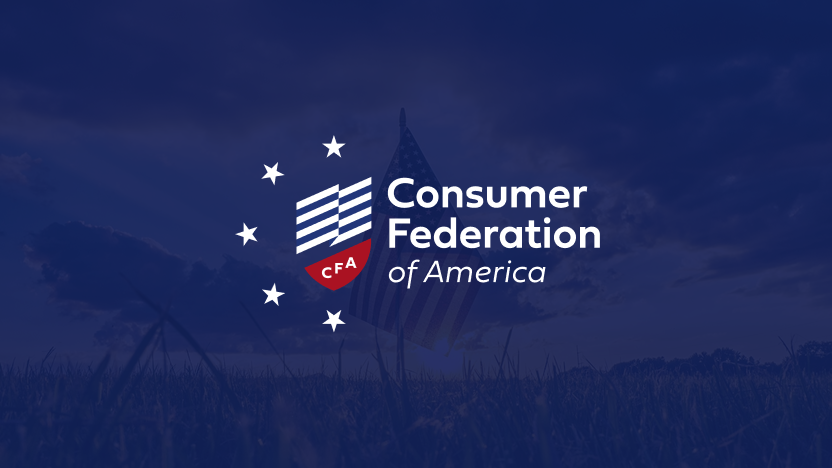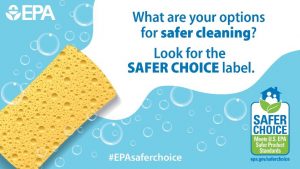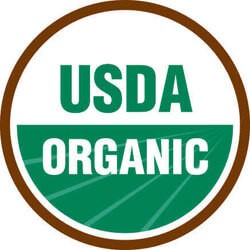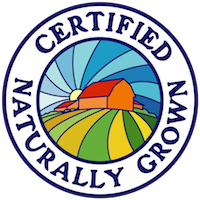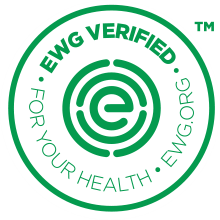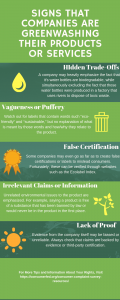Consumer demand for environmentally sound products has recently grown. As a result, many companies in various industries have attempted to capitalize on this trend. However, do the claims of “caring about the environment” or putting a green leaf on a product really mean the products are environmentally sound? The practice of conveying a false impression that a company or its products are more environmentally sound than they really are, is called “greenwashing.” Companies do this through packaging or marketing their products in a manner that makes them seem environmentally conscious or clean when they’re no different than their competitors.
As a result, companies falsely claiming to be “environmentally friendly” are successfully misleading consumers into buying their products and often at inflated prices.
Are there any signs that a company may be greenwashing their products or services?
Luckily, these companies are often not as discreet as you might think. There are several indicators of greenwashing that consumers should look out for.
- Hidden trade-offs – Often, specific environmental issues will be emphasized at the expense of another (potentially more concerning) issue. For instance, a company may heavily emphasize the fact that their water bottles are biodegradable, while simultaneously excluding the fact that those water bottles were produced in a factory that uses rivers to dispose of toxic waste.
- Lack of proof – Claims are not backed up by evidence or third-party certification. However, even if a company provides any proof, it is important to check its source. If the evidence comes from the company itself, it may be biased or unreliable.
- Vagueness or Puffery – Claims may be lacking in specificity or phrased in a way that seems meaningless. Watch out for labels that contain words such “eco-friendly” and “sustainable,” but no explanation of what is meant by those words and how/why they relate to the product.
- False Certification – Some companies may even go as far as to create false certifications or labels to mislead consumers. Fortunately, these can be verified through websites such as the Ecolabel Index.
- Irrelevant claims or information – Unrelated environmental issues to the product are emphasized. For example, saying a product is free of a substance that has been banned by law or would never be in the product in the first place.
- Fibbing – Simply using claims that are blatantly false.
Yes, if consumers want to verify if a company’s claims are legitimate, they should do the following:
- Examine the claim – Is the company certified by a legitimate third-party organization? Is their claim even logical or plausible? If it sounds too good to be true – it probably is.
- Look for proof - Is there empirical evidence (statistics, scientific studies, etc.) to back up their claims? Also examine where the evidence comes from.
- Check for consistency – Is the company advertising itself as “eco-friendly” in other countries? Are they still doing what they claim months/years after their advertisements?
- Follow the money – What organizations does this company support? Who are they donating their money to?
- Cleaning products
- Food products
If a product is labeled as “non-GMO,” it has not been genetically modified and/or does not contain any genetically modified organisms. GMO’s (genetically modified organisms) are created in laboratories by scientists using a variety of genetic modification/engineering techniques. Regardless of which side of the debate the consumer lands on, if a non-GMO product is what’s desired, looking for the “butterfly” seal is the best approach.
Note, “non-GMO” claims could be made about food that cannot be genetically modified (e.g., salt or water) or products for which genetic modification would be irrelevant (e.g., kitty litter).Products that are labeled as “organic,” have been produced by methods that comply with the standards of organic farming. For example, all organic products must be handled and grown without the usage of GMO’s. The USDA has a certification program that verifies if a product is truly organic, and all approved products are awarded a certification label. It is illegal to label a product as organic unless it has been approved by the USDA (see Organic Regulations), however, that may not deter some manufacturers from slipping the term “organic” in the company or product trade name. Consumers should always look for an USDA label.
As for the term “natural,” there is no strict definition. In 2016, the U.S Food and Drug Administration (FDA) asked the public to provide comments and information on the use of this word on food products. However, no formal legal definition of this word has been established and the FDA has not considered if products with the term “natural” have any nutritional or health benefits. Therefore, consumers should not assume that a product provides any health benefits just because the label says it is “natural” or “naturally derived.” Many common compounds and preservatives, at one point, were sourced from nature. These ingredients, while derived from nature, may nevertheless be a dozen steps removed and entirely lab-made. If consumers are looking for a reputable “naturally grown” certification and label, they should look to “Certified Naturally Grown” which requires farmers to produce food without the use of any synthetic pesticides, fertilizers, or genetically modified organisms. Currently there are about 750 certified farms nationwide.- Cosmetics
Unfortunately, greenwashing is also widespread in the cosmetics industry. The FDA does not have the legal authority for “pre-market approval of cosmetic product labeling,” leaving the responsibility of properly labeling a product up to the manufacturer. Of course, there are certain labeling requirements that products must abide by. However, according to the Environmental Working Group “Lax federal regulations mean that 'claims like ‘natural,’ ‘nontoxic,’ ‘plant-based’ and ‘free of’ have no legal basis in the personal care industry.” Although mislabeling a product is illegal, the lack of government regulation in the cosmetic industry still leaves ample room for misrepresentation. This is particularly concerning given that a lot of the products we use on our skin can end up inside of our bodies. In fact, one dermatologist went so far as to advise consumers that natural products aren’t meaningfully different from their “unnatural” counterparts. For those who want to buy “greener” cosmetics, EWG has a “Skin Deep®” seal for products deemed “less-hazardous” and the “EWG Verified™” seal on products that do not contain any ingredients on its unacceptable or restricted lists.
- Lawn service
For consumers interested in maintaining an organic lawn or garden, it is important to pay close attention to the products or service they employ. Yet again, one should look out for any signs of greenwashing. For example, claims of “natural” landscaping may only mean that the landscaper will use plants natural to the climate and not that pesticides and herbicides are avoided. Sources such as your local Department of Environmental Protection (DEP) may have guides on hiring a lawn care provider. If buying products off the shelf, consumers can look for products that have been certified under the OMRI label. Furthermore, it also helpful to become familiar with your state’s fertilizer law and guidelines.
- Local Green Businesses
In conclusion, those who are seeking to be environmentally conscious should be aware of the widespread usage of greenwashing, and how to spot and avoid the scams. Consumers should also be aware of reputable standard setting bodies and the seals or labels to trust.
This blog is one of a series of articles contributed by state and local consumer agencies in connection with the annual survey about consumer complaints conducted by Consumer Federation of America. The survey report provides “real life” examples of complaints and tips for consumers. Have a consumer problem or question? Find your state or local consumer agency at https://www.usa.gov/state-consumer.